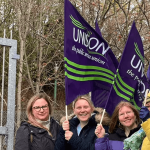
britain politics immigration
Last June, over half of Albanian asylum claims in Britain were successful. UK parliamentary committee found “little evidence” that Albanians need international protection in their own country.
This week, the UK Parliament’s Home Affairs Select Committee, a cross-party committee of MPs that oversees the Home Office, found “little evidence to indicate that significant numbers of Albanian nationals are at risk in their own country” and need asylum in the UK.
As of June 2022, 51% of Albanians seeking UK protection were granted. Albanians in several European countries had a much lower rate. In Germany, no Albanians received asylum.
“Albania is a safe country, it is not at war and is a candidate to join the European Union,” the select committee’s July 2022 report states. However, “some Albanian citizens making asylum claims will have been trafficked, and women are disproportionately at risk from this form of crime.”
12,301 Albanians crossed Channel in 2022. 45,755 migrants crossed the Channel to the UK in 2022, with over a quarter Albanian. The number of Albanians crossing the border rose from 800 to 12,301 in 2022, “a rise that was both unexpected and unexplained,” the report said.
Women received 88% of Albanian grants in June 2022, compared to 13% for men.
Keep Reading
The government met with Albanian authorities several times while the committee prepared its report. After several verbal exchanges, the two countries signed a series of agreements that sent several thousand Albanians from the UK to Albania.
“Politicians, commentators and others should be careful to show restraint in their language and not single out Albania as the sole cause of the UK’s asylum pressures,” the report advised, “maintaining positive relations with the Albanian government should also be a key priority to ensure that the UK can return irregular migrants and offenders from UK prisons.”
Albanians in asylum backlog
The UK’s “legacy backlog” of pre-June 2022 asylum applications includes many Albanians.
Braverman told the committee that this backlog had dropped by 17,000 from 92,000. Diana Johnson, the committee’s chair, noted that asylum applications had increased from November 22 to May 23, even though the government had started to clear its “legacy backlog.”
The select committee found economic migration from Albania to the UK. The report stated that Albanians will continue to come to the UK until their country becomes wealthier, making small boat crossings in hopes of better job prospects and higher incomes.
The committee recommended that the UK promote Albanian work visa programmes to “alternative to people smuggling gangs and reduce the burden on the asylum system.”
Asylum alternatives: work visas
The committee found 325 Albanian work visas in the first nine months of 2022. From evidence submitted to the inquiry, there was a “perceived difficulty in obtaining work in the UK through legal means [which] could be driving people towards clandestine migration routes.”
The committee advised the government to promote visas to fill UK worker shortages and enable “transfer of wealth back to Albania.” It recommended short-term or seasonal work visas for construction and agriculture.
The UK government’s website allows workers to apply for a six-month seasonal work visa to work in horticulture, “for example picking fruit and vegetables or flowers.” Seasonal poultry visas were available for October 2–December 31 work. Horticulture workers could apply at any time, but poultry seasonal workers had to apply by November 15.
Need of Work Visa
Workers must “have a sponsor and meet the other eligibility requirements,” including being 18 and able to support themselves in the UK. Applicants must have £1,270 [€1,486]. The worker must attach a certificate of sponsorship reference number from the sponsor to the application. You must work for that sponsor for the duration of the visa.
Applying requires proof of self-sufficiency and a recent bank account. Visa applications must be made three months before starting work and cost £259 (€303). For poultry work, you can stay between October 18 and December 31, and for horticulture, six months.
Work in your certificate of sponsorship or study in the UK. You cannot get public funds, work a second job, or bring family members.









